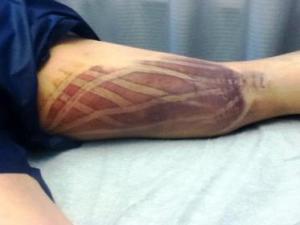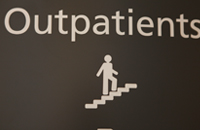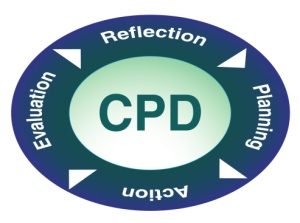Week Five
I have been thoroughly disappointed not to have blogged in my usual way over recent weeks. The purist in me will never truly forgive the absence of weeks three and four blog! That said, I do have some exciting grounds for mitigation, and, given it’s just you and me that will read this anyway, I won’t mind if you don’t! So, I’ve not had chance to share my half-way assessment feedback, my poignant patient interactions, my experience in elective surgical theatres nor my interview episodes…so much has happened since my last blog entry. I must also not forget, in my haste to bring you up to speed, to acknowledge that fact that yesterday saw me complete my final ever Friday as a student on clinical placement. It hardly seems possible that I am now marking the ‘lasts’ of everything student-based when so recently I was floundering and flummoxed by my ‘firsts’!
Half Way Feedback
As hoped, I received no surprises when being given my feedback. I was congratulated for my interpersonal and communication skills and reminded I need to broaden my scope of treatment options, although my educators recognised my awareness of my own learning needs and limitations, reminding me not to be over-critical of myself…Who, me? Never! I am encouraged to continue as I have been progressing over the course of the placement. Phew, on track then I guess?!
From Head To Toe
I often find myself reflecting back to my second placement experiences whilst here in outpatients once again. Working within a different team, in a different trust, serving a different geographical community, has provided a remarkably different outpatient experience. For this I feel grateful. Not only has it given me the opportunity to further develop my neuromusculoskeletal (MSK) handling and treatment skills, it too has demonstrated to me the potential differences in patient experience. In one department the approach was quite ‘hands-on’ with a focus on manual therapy, the other much more ‘hands-off’, with emphasis on patient self-management and coping strategies. I have also been exposed to two very different kinds of commissioning contracts in service delivery. While both departments received referrals for ‘in-house’ trauma and orthopaedics (fractures, joint replacements and surgical rehabilitation) only one received GP-led referrals for neck and back complaints, the other being outsourced to the private sector. Conversely, whilst on my first outpatient placement I was able to treat so-called ‘peripheral joint’ referrals which my current placement experience is lacking. This has meant that, across both placements, I have managed to experience a full spectrum of outpatient referrals, including chronic low-back pain, osteoarthritis of the knee, whiplash-associated disorders and tendon ruptures. I feel privileged to have been able to experience this as a student and have grown really quite fond of MSK physiotherapy as a consequence.
An Understudy Role

Surgical Exsanguinator – used as a tourniquet during total knee replacement surgery
I have been lucky enough to be able to witness first-hand a day in the life of an elective orthopaedic theatre this week. Organised by my educator, in response to my request to gain a greater insight to the surgical procedures I was subsequently rehabilitating, I spent all day on Monday in theatre! Arriving first thing, I was swiftly adorned with a set of surgical scrubs, a pair of rather fetching white Crocs and a hat and mask to finish the look! What followed was a jaw-droppingly amazing experience. I spent some time with the anaesthetists, observing their role, watching patients receiving varied levels of sedation such as spinal blocks and general anaesthesia. I then watched with great interest as the surgeons performed arthroscopic knee surgery, but what I w as really there to see were the later total knee and total hip replacement procedures. I was not disappointed! I was quite literally an arm’s length away from the business-end of the surgery, seeing everything from an unobstructed view! I was particularly fascinated by the patient who lay on his side chatting away wide awake, whilst separated by a blue sheet out of view, his lower limb was contorted across his body with his knee pointing backwards! The precision with which the surgeons dislocate, insert prosthesis, relocate, test, dislocate, cement the hip joint was awe-inspiring! Hammering, drilling, sawing…bone fragments, flesh and blood. Nothing perturbed me – and I was pleased not to be one of the recounted observational students that had previously been scraped off the floor post-fainting episode! That was until the stench of the bone cement hit me! Being pre-mixed by theatre practitioners with a stop-clock ticking I have never smelled anything so repugnant in all my life – and that includes the experiences that will stay with me from my time on the burns and plastics placement! I was able to retain my composure and upright posture but oh deary me, that smell was awful!
as really there to see were the later total knee and total hip replacement procedures. I was not disappointed! I was quite literally an arm’s length away from the business-end of the surgery, seeing everything from an unobstructed view! I was particularly fascinated by the patient who lay on his side chatting away wide awake, whilst separated by a blue sheet out of view, his lower limb was contorted across his body with his knee pointing backwards! The precision with which the surgeons dislocate, insert prosthesis, relocate, test, dislocate, cement the hip joint was awe-inspiring! Hammering, drilling, sawing…bone fragments, flesh and blood. Nothing perturbed me – and I was pleased not to be one of the recounted observational students that had previously been scraped off the floor post-fainting episode! That was until the stench of the bone cement hit me! Being pre-mixed by theatre practitioners with a stop-clock ticking I have never smelled anything so repugnant in all my life – and that includes the experiences that will stay with me from my time on the burns and plastics placement! I was able to retain my composure and upright posture but oh deary me, that smell was awful!
My day in theatre meant I know have a much better idea of what a patient experiences and the extent of the surgical intervention. I am also in a more informed position when managing post surgical joint replacement patients in future. Oh, and as an aside, the hip is a really rather deep joint – who knew!?
Interviews
Part of my mitigation for temporarily shelving my blog posts has been my focus on securing a physiotherapy post to progress into on graduation later this year. It has come around insanely quickly and I was somewhat unprepared when my preferred Trust released an advertisement on the NHS jobs website. Given a gentle nudge by a previous educator I decided to apply to ‘see what happened’. I visited the CSP website to consult their survival guide, perused the ever-useful archives of Physiotalk, consulted various contacts both on- and off-line and familiarised myself with the Trust and the job specification in a bid to write an adequate personal statement. Whatever I did, it worked and within ten days I was called to interview with a week’s notice. The interview process was gruelling for me. The only other experience I could liken it to was a distant memory of my recruitment assessment day for the Metropolitan Police. I know some people shine at interview and manage to excel; I am not one of those people! Various formats of assessment, including group tasks, a practical element and a panel interview ensued. I am self-critical, this I know. However, I was certain I had not performed to my best abilities and stress and nerves had impaired my performance. “Oh well” I thought as I resigned myself to having to repeat the experience. I was genuinely surprised and frankly elated to be offered a permanent band five rotational post to start after graduation this summer! In my blog absence I have also been applying for another online-based role which again entailed a personal statement and interview. Once again, I could not be more pleased to share the knowledge that I have been successful in this pursuit also. Perhaps later blog posts may expand on this role.
Final Week Ahead
Next week sees me complete my student placement experiences. This in principle means I will have also completed my blogging journey. I have found the process of writing a reflective blog an invaluable addition to my studies. A journey of self-discovery but also an opportunity to self-regulate my learning needs. I cannot imagine it will have served its purpose in full given the learning I still have to do within my first band five role. The feedback and interactions I have had from this blog has fuelled my drive to keep it going, even when workload is high. I look forward to concluding my student experiences next week in my final blog entry and welcome your comments as always.









